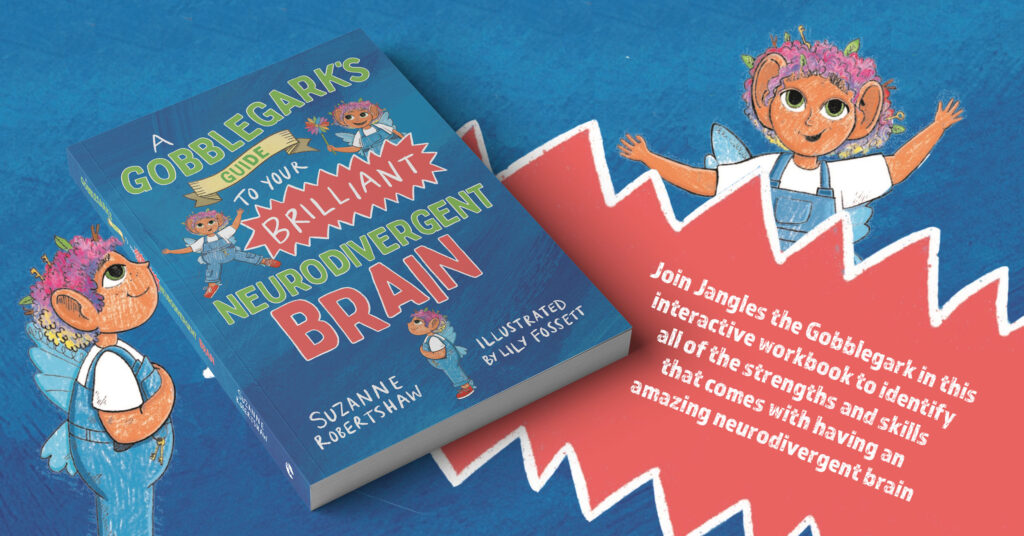Celebrating differences: Empowering children to embrace their neurodivergent strengths!
In this blog, written by the author of A Gobblegark’s Guide to Your Brilliant Neurodivergent Brain, Suzanne Robertshaw, she shares what neurodivergence means to her, and how we can help children celebrate their differences.

When you think of the word neurodivergent what does it mean to you?
Different-thinking? Someone who will face a lot of challenges in their life?
This word was originally created by autistic sociologist, Judy Singer as a more positive alternative to the medical definition which insists on using language such as ‘deficit’ and ‘disorder’ to talk about specific learning differences (SpLDs).
The medical model encourages doctors, educators and society in general to view someone with a learning difference as having mainly problems or weaknesses.
It is true that the society we live in is mainly structured in a way that is geared towards neurotypical people, ie. those who do not have a neurodevelopmental condition. The natural consequence is that those who are neurodivergent will tend to find the world of work and education challenging.
So how can we change this situation in order to ensure that neurodivergent children grow up to be resilient, confident adults.
Be authentic
We’ve all heard the word ‘superpower’ bandied about in connection with people who have an SpLD . This has provoked strong emotions within the neurodivergent community. Some people feel that it unfairly represents their real-life experience, stating that it could be damaging to those who are neurodivergent.
Therefore, if you are a parent or a teacher of a neurodivergent child, it is vital that you are authentic during all communication.
Accept that life can be challenging and understand that areas such as school, relationships and home life will not necessarily be without obstacles.
The key is to be balanced when you are pointing out the strengths of your child’s brain. Try and ensure that they are not allowing their learning difference to beat them down into ‘freeze’ mode, where they get stuck in a negative pattern of thinking and feel unable to function.
Basic psychology states that everyone enjoys being praised. Whether you are a 5-year-old child or a 65-year-old employee. If someone congratulates you on doing something well, then you feel like you want to do it that way again and again, in order to keep the dopamine flowing.
So use targeted praise for anything that your child succeeds at. This could include something small, like remembering their pen for school or something bigger, such as arriving at school on time.
Many people with a learning difference can spend their whole lives receiving negative feedback, because they are being constantly measured according to neurotypical standards. So, praising them when they do something well is not going to ‘soften them’ or give them an unrealistic picture of themselves. It can only serve to make them feel more confident and likelier to succeed.
Be consistent
Consistency is key. Try and use the 3 to 1 rule which adheres to making sure that for every 1 negative thing you say, add another 3 positive statements about your child. If this is consistent enough, then you will begin to change the running narrative in your child’s brain. But remember to keep being authentic. Children can sense when a parent is being disingenuous and if you start throwing out, ‘well dones’ left, right and centre, without clearly telling your child what they have done well, then it will become meaningless.
Empower, don’t micro-manage
Empowering your child to be their own cheerleader is one of the greatest gifts you can give to them. Encourage them to follow their interests, understand the strengths of their brain and how they learn best and then let them utilise these strategies independently. And remember, it is ok to allow them to fail, that is how children learn.
One of the most difficult things I did with my son was to stand back and watch him being late for school. He begged me to give him a lift and was clearly very stressed but I knew that if he arrived late, as unpleasant as it would have been for him, he would never make the same mistake again. And he didn’t. Of course, we supported him in strategies to plan his routine, but we allowed him to follow this through independently.
Spread the message
And finally, it is vital that a strength-based approach is carried through to all areas of your child’s life. So that means clearly communicating with the school, any clubs they are involved in and other family members. Everyone should be on board in order to reinforce the positive narrative. Ask your child’s teachers to use strategies that allow their brain to work to its best ability and follow the targeted praise rule. Encourage other family members to get enthusiastic about your child’s interests, asking questions and pursuing activities together that will build confidence.
Whatever you do, remember the real meaning of neurodivergence. Having a differently-wired brain should not condemn your child to automatic failure. These brains are capable of the most amazing feats, they just need to be nurtured and celebrated.